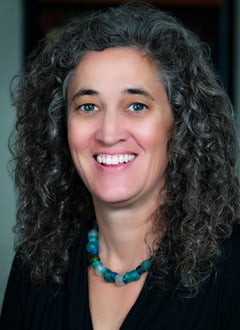
Minds on Mathematics is a landmark, practical resource for bringing the workshop model to life in your math classroom. In today’s blog, which is adapted from the book, author Wendy Ward Hoffer discusses the heart behind the math workshop model and the benefits this instructional approach offers to you and your students.
“Our beliefs shape our classrooms.” —Wendy Ward Hoffer
If we believe that math is difficult or inaccessible, that the important work of math is memorizing and following procedures, and that some kids are born capable and others not, we create classrooms where teachers are experts, students are empty vessels to be filled, and failure is an acceptable option for some. We track students by abilities. We let some students entirely off the hook.
Yet, if instead we believe that all students can and must learn math, that the important work of math is thinking, and that all learners are capable of mastery, we create classrooms where teachers serve as coaches, students engage as a community of learners, and all can “get it” together. Creating such communities takes courage, effort, and patience, but the payoffs are tremendous.
Workshop model instruction is about cultivating all learners’ understanding. The purpose of a math workshop is to put into practice our belief in all students’ mathematical abilities by creating and facilitating learning experiences that invite individuals to construct and negotiate deep conceptual understanding, as well as develop fluency with numbers. Workshops offer learners time to experience
- focus: delve deeply into a concept, focus on understanding important ideas well
- congruence: make connections among big ideas that spiral from grade to grade
- rigor: balance conceptual understanding, procedural fluency, and application.
Workshops are driven by the notion that deep and thoughtful understanding requires multiple exposures to a concept from a variety of angles and that once learners understand concepts, they become flexible problem solvers. Workshops offer students the time to attain the understanding. As some states and districts unveil increasingly longer lists of standards and textbooks grow thicker with each edition, we need to have the courage to slow down, to adjust our goal from “coverage” to “understanding.”
When visitors observe an effective workshop model classroom, they are often stunned by the ways in which the “classroom runs itself.”
Though there is often only one correct answer to a mathematical question, there may be an infinite variety of ways to arrive at that answer, to think about and understand its meaning. Rather than devoting time to memorizing algorithms (cross multiply and divide), workshops invite students to employ math practices and approaches that work for them. Workshops open doors to creative thinking and unique problem-solving methodologies, target conceptual understanding, and promote intellectual flexibility.
With faith that each child, given time, has an innate ability to reason out a solution to a problem, even if their initial approach and strategy may differ from how we believe things “ought” to be done, we can begin to turn over the responsibility for learning mathematics to our students. This alone can be a challenge: Giving students control of the conversation can feel unsettling to a teacher who spent time earnestly trying to stave off confusion. Yet, to learn best, students need to be fully engaged as thinkers, rather than permitted to sit passively while we perform mathematical stunts.
This is not to say we should toss each student a prealgebra book and then go check our email; rather, I propose a carefully structured learning environment and specific use of time that invites math learners to purposefully engage as a community in worthy tasks designed to draw forth their understanding.
When visitors observe an effective workshop model classroom, they are often stunned by the ways in which the “classroom runs itself.” Students can achieve an amazing level of self-sufficiency with great effort, targeted scaffolding, and teacher vigilance. Crucial ingredients for a focused workshop include clear minilessons, frequent monitoring and redirection, collaboration and support, differentiation through conferring, and work with invitational small groups.
Most math teachers I know work within a system of constraints that include curriculum, materials, unit plans, school schedules, department expectations, district and state tests…the list goes on. When they raise concerns about whether they are allowed to make changes to the way they teach and what they cover, I remind them that the goal of math instruction is student understanding. As long as teachers continue to target the learning goals agreed upon by their department, district, or curriculum, and students can demonstrate understanding on the periodic standardized assessments, administrators tend to be flexible with teachers exploring new means to those ends.
If you share the belief that all students are capable of brilliance, that our responsibility as teachers is to foster their thinking, then you need not fret that you might do this “wrong.” If your students are wrestling with ideas, sharing their thoughts, and making progress as mathematicians, you are on the right track.
Click here to learn more about Minds on Mathematics or to read a sample chapter from the book.
♦ ♦ ♦ ♦
 Wendy Ward Hoffer is Senior Director of Education with the Denver-based Public Education & Business Coalition (PEBC). She works with teachers, schools, and districts locally and nationally to promote rich thinking in all content areas, especially in math and science.
Wendy Ward Hoffer is Senior Director of Education with the Denver-based Public Education & Business Coalition (PEBC). She works with teachers, schools, and districts locally and nationally to promote rich thinking in all content areas, especially in math and science.


